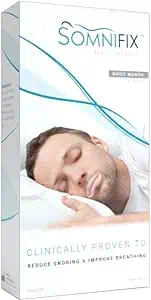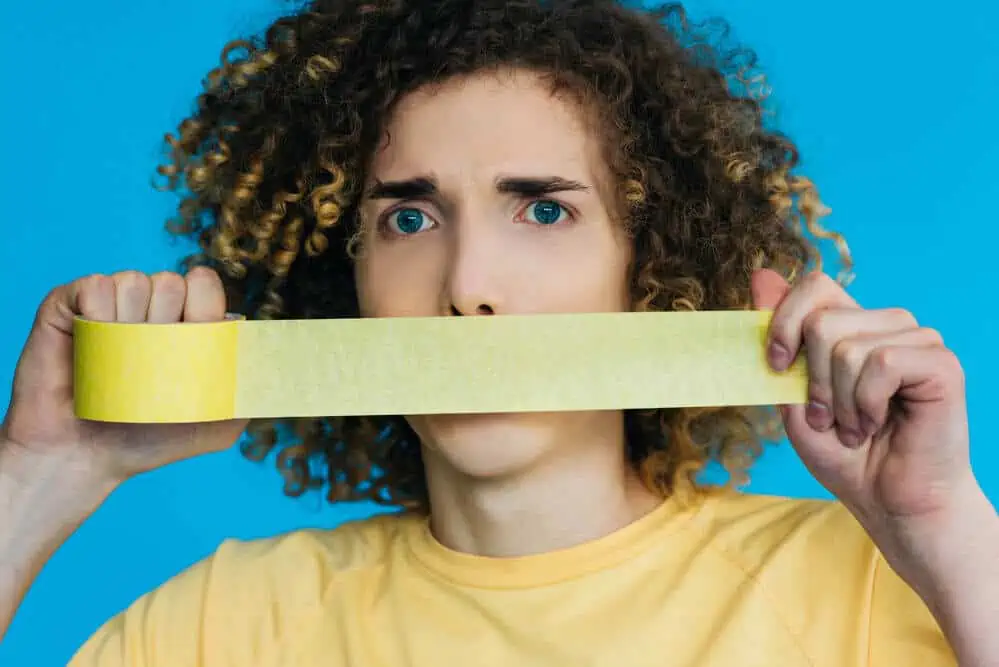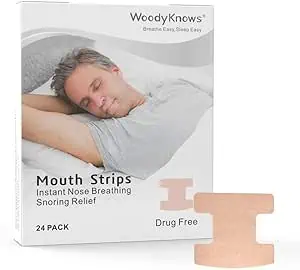Sleep disorders cause many Brits to lose out on the shut-eye that they need. Breathing with your mouth open can cause a variety of general and oral health problems. Thankfully, there is a simple solution that may let you put your sleeping woes behind you: mouth taping.
Sound bizarre?
That's what most people think at first, but using tape to keep your mouth closed and encourage nose breathing can be extremely beneficial. Breathing through your nose is essential to good sleep and improved physical, dental and oral health.
That's why we've dedicated this article to mouth taping and how to sleep with your mouth closed. We'll also answer the following questions:
- What is mouth taping?
- What are its benefits?
- How does it work?
- What products can you use to keep your mouth closed while sleeping?
We hope this information helps you get better sleep, and improve your oral and overall health.
In This Article
What is mouth taping?
Before explaining what mouth tape actually is, it is important to understand what it is not.

Upon first hearing about it, most people imagine taping their mouths closed with duct tape or any other random tape bought from a store. In fact, we're talking about sleep-safe tape which is a minimally invasive and totally pain-free method to stop mouth breathing at night and promote breathing via the nose.
There are various products on the market, such as Somnifix sleep strips, that help you train yourself to sleep with your mouth closed. These strips are hypoallergenic, comfortable, and easily removable. Most types of mouth tape are soft with a gel-like consistency and shaped to fit precisely over your mouth. Strips are made with built-in vents so if your nose gets blocked up at night, you can still breathe through the tape. What's more, this tape comes off easily leaving no residue on the lips.
There are other products available, which we'll look at in more detail later on. But regardless of what method you use, the basic concept is that keeping your mouth shut at night promotes proper nasal breathing.
Bear in mind that if you have the ingrained habit of breathing through your mouth, then it's likely that it will take a while to get used to breathing through your nose at night. In order to help the process along, you should also make sure that you practice nasal breathing throughout the day as well. Mouth breathing can be a sign of an underlying health condition, so it's a good idea to have a medical checkup if this has been affecting you.
Is it bad to sleep with your mouth open?

Yes, it can be quite harmful to sleep with your mouth open. Why? The human mouth is for talking, tasting, and eating, while the nose is for smelling and breathing. When your body parts start performing functions other than those intended for them, problems begin to arise.
Conservative treatments at home like mouth taping may be all that’s needed to treat patients with mild to moderate sleep apnea. These treatments also include lifestyle modification (such as losing weight, quitting smoking, or limiting alcohol intake) and using a CPAP machine while you sleep.
If nonsurgical treatments are ineffective, or if the condition is severe, surgical intervention may be the most effective treatment. This involves repositioning the upper and/or lower jaw or removing tissue from the back of your throat.
Depending on your condition, the procedure may take place right in an oral surgeon’s office or at a hospital.
Dr Michael Ferguson, Oral Surgery Sevices
When you breathe through your mouth, a larger volume of air is forced through the airway than when you breathe through your nose. Inhaling air in such volumes can cause the airway to collapse, resulting in sleep apnoea. Furthermore, children who practice mouth breathing may develop various health issues such as misaligned teeth, abnormal facial growth, poor sleep habits, and decreased cognitive skills.

Experts suggest that the symptoms of mouth breathing in most teenagers and children are similar to the symptoms of ADHD. Scientists have also indicated that more than half of children diagnosed with ADHD might be mouth breathers.
Mouth breathing in adults may lead to other problems such as snoring and dry mouth. It can also worsen asthma and disrupt the oxygen supply to the brain, heart, and other organs. Mouth breathers also tend to experience fluctuations in heart rate and blood pressure.
And if you continually breathe through your mouth, especially at night when there is naturally less saliva, it's not great for your teeth. We explain this in more detail in our article about how to stop mouth breathing.
How to tell if you are a mouth breather
Before you can actually start using a sleep tape to keep your mouth shut at night, it is important to make sure that you really need it. So how do you know for sure if you are a mouth breather?
Many people who breathe through their mouths don't realise it at all. No matter how much nose breathing you practice throughout the day, you can still start mouth breathing as soon as you go into a deep sleep. The following are all signs that you might want to try taping your mouth shut at night:
- Constantly tossing and turning at night
- Waking up in the middle of the night to urinate
- Drool-covered pillows
- Snoring
- Having stinky breath in the morning
- Bleeding gums or gingivitis
- Signs of teeth grinding
- Frequent cavities
- Regular oral thrush symptoms
- Sleep-related problems like sleep apnoea
Benefits of mouth taping
Let's have a look at the different ways that mouth taping can help your health.
Increased levels of nitric oxide
Both children and adults who breathe through their mouths develop a nitric oxide deficiency in their bodies. Around 25% of nitric oxide is produced in the sinuses within the nose. When you stop breathing through the nose and use your mouth instead, it reduces the amount of nitric oxide that your body can access.
But why is nitric oxide so important for the body? What happens if its levels suddenly drop? The following table summarises the advantages of having adequate nitric oxide (NO) levels in the body as well as the disadvantages if its deprivation occurs.
Advantages of adequate NO | Disadvantages of decreased NO |
Enhancement of learning and memory | Worsened vascular function in the heart |
Improvement of sleep quality | High blood pressure |
Regulated blood pressure | Depression and anxiety |
Regulation of inflammatory responses | Chronic inflammation |
Pain relief | Decreased immunity |
Weight loss | |
Improved mental health |
Decreased risk of teeth grinding
Many people who sleep with their mouth open suffer from some form of disordered sleep breathing such as sleep apnoea. When you suffer from disordered sleep breathing, your body uses teeth grinding as a natural reflex to force air through your airway. While it is actually a life-saving process, teeth grinding may also lead to extensive tooth damage. It may cause tooth decay, yellowing of teeth, and gum recession, as well as premature ageing of the teeth.
Decreased risk of dry mouth

Many people who have dry mouth aren't actually aware of it. Waking up feeling thirsty, or having thick saliva in your mouth throughout the day are some signs you may be suffering.
Having a dry mouth is not only uncomfortable but also a potential danger to health. It can negatively affect your dental and oral health and is harmful to your oral microbiome as well. A dry mouth can prevent saliva from properly coating your teeth; this saliva is important in keeping your enamel healthy, so as a result, cavities begin to develop.
Helpful in diagnosing serious issues
Mouth taping not only promotes nose breathing during sleep but it's also a great diagnostic tool. For example, a lot of patients seek help from an ENT (head and neck specialist), a sleep medicine physician, or an allergist after realising that they are unable to use mouth tape throughout the night. These specialists can then find the root causes of the patient's mouth breathing, and start treatment.
Best mouth taping products
So, are you ready to give it a try? Here are some of the best products for keeping your mouth closed while you sleep.
SomniFix sleep strips
SomniFix mouth tape is a good product for people trying mouth taping for the first time. Here's why:
- Clinically proven to improve breathing and reduce snoring
- Shaped to fit over the lips and avoid facial hair
- A built-in vent allows for limited mouth breathing
- Comes off when the mouth is opened
- No sticky residue in the morning
Thousands of happy consumers are using these to improve their sleep by taping their mouth shut at night. Here's what one reviewer says:
“I can't rate this product highly enough. These little strips are perfect. They are comfortable, easy to use, the adhesive lasts all night and they actually hold my lower jaw in place so my mouth can't drop open (not a good look – I know!!) As a result, my sleep has improved dramatically, my snoring has virtually disappeared and I don't wake up with dry mouth and a slight headache from overnight dehydration. Wonderful!”
-Mrs C S Ross, Amazon reviewer
WoodyKnows Mouth Tape

This sleep tape from WoodyKnows is different in a couple of ways. First, the sideways H-shape leaves some space at each side of the mouth, which could be helpful if you're anxious about completely taping over your mouth. However, the larger adhesive surface area means that any facial hair around the mouth must be removed before using the strips.
“I’ve been a mouth breather for years and thought there was nothing that could be done, I started using these and I cannot believe how good they are! I no longer wake with a sore throat and my nose is clear, more importantly, me and my partner are getting a full night's sleep.”
-West, Amazon reviewer
Anti-snoring chin strap
Something completely different you could try is a chin strap. Although marketed mainly for snoring problems, these serve the same purpose of keeping the mouth closed at night by gently pulling the chin up towards the head. This one is popular and gets some of the best reviews on Amazon. But there are various designs available and you may need to try a couple before finding one that is comfortable and stays on all night.

Neomen custom night mouth guard
Another way to stop yourself mouth breathing at night is with a mouth guard. This one-piece device moulds to fit your teeth and then creates a barrier so that even if your lips open, you can't comfortably breathe through your mouth. There is a small slit to allow air through in an emergency, though.
Devices like this can also be effective at stopping thumb-sucking, and can protect teeth from the effects of nighttime bruxism. One mouth guard should last at least three months, so this can work out slightly more cost-effective than single-use strips, too.
Tips for optimal mouth taping
Mouth taping may seem like a piece of cake; all you need to do is get some tape and use it to cover your mouth. The tape will encourage you to breathe through the nose even when you are in deep sleep.
But how exactly do you use mouth tape? Here are some pointers to help you get it right:
- Use specially-shaped strips that will fit onto your lips without sticking to any facial hair. We mentioned Somnifix above as a good option that you can purchase online.
- Try puckering your lips out first, then place the tape on. Once the tape is in place, let your lips relax into their normal closed position.
- Once you put the tape on your mouth, try opening your mouth once. If it is not fairly easy to open the mouth with a bit of force, try the process again to obtain a better fit.
- Let your body adjust: You might want to try taping your mouth for a fixed period of time during the day just to make yourself more comfortable and get used to the practice of mouth taping at night.
Using medical tape
If you do decide to use another tape like Micropore for mouth taping, here are some additional tips:
- Apply a thin layer of Vaseline to the lips before taping them: Applying Vaseline in a thin layer can reduce the sticky feeling on your lips in the morning.
- If you are not comfortable taping your entire mouth, apply the tape vertically to begin with. Leave a small space for breathing through your mouth. Keep practising this until you become completely comfortable with mouth taping.
- Tear off a little more than you need and fold over at each end to form mini handles. These handles will make it easier to pull the tape back for a moment. For example, if you need to take a sip of water, talk, or cough, you can use the mini handles to pull the tape aside and then readjust it once you are done.
In the following video, you can see a helpful comparison of SomniFix vs regular medical tape. Note that the prices are in NZ$ but the same principle applies. Alex discovered he could use a single SomniFix strip for up to five nights, which made them much more affordable.
If the tape always seems to come off before you wake up, this could mean that there is some underlying problem that is not allowing you to breathe through your nose while sleeping. If this continues to happen, you'll want to talk with your doctor about it. They'll help you get to the root of the problem and find a solution. Some common culprits behind this problem include having a dusty bedroom, a deviated nasal septum, or allergies.
Even if you don't have any underlying health problems, it could still take you a few weeks or months to get used to mouth taping. Don't be disappointed if you wake up with your mouth open at the beginning.
It is also important to note that there are no contraindications for mouth taping. Pregnant women and even older children can use mouth tape safely without any fear. If you are encouraging your children to use mouth tape, make sure they are still able to open their mouths with ease. The use of mouth tape is, however, not recommended for babies or young children.
Conclusion
Breathing with your mouth open, whether during the day or while you sleep, can cause a variety of oral health and general health issues. For this reason, many experts recommend taping your mouth at night as a preventative measure. While some people tend to stop mouth taping once they overcome the problem, it is generally recommended to keep doing it forever.
Mouth taping is safe for everyone to try (except for small babies and younger children) and has no negative effect on health. For best results, we recommend purchasing a sleep-safe mouth tape that is made for this purpose. Also, it's always best to consult your doctor before beginning an at-home treatment.
FAQs
Is mouth taping safe if my nose becomes blocked?
Most commercial mouth tapes have a vent to provide your nose with a backup in situations where your sinuses get congested. These strips are also designed to come off easily. There is no way they would get in the way of your body's natural need to keep breathing. You might even remove the tape yourself in your sleep.
For this reason we don't recommend using micropore tape for mouth taping; only products specially designed for this purpose. If you're still concerned then consider using a chip strap or mouthpiece to prevent mouth breathing instead.
Are there people who must never use mouth tape?
So far, there are no contraindications for mouth taping. This means that anyone who wishes to use mouth tape can safely do it. The process is not recommended for babies or very young children. However, for older children and adults, mouth taping is perfectly safe.
How long should I keep mouth taping?
Many people who start mouth taping never stop. And while for some people, a few weeks or months is enough to break a bad habit, others will require more time. Speak to your doctor about what they recommend for you specifically.
What if mouth tape doesn’t work for me?
If you find that your mouth tape is separated when you wake up, it could be an indication that you are still breathing through your mouth at night. This may happen to anyone on occasion. However, if you find it happening frequently, you should consult your doctor.
Acta physiologica scandinavica: Decreased pulmonary vascular resistance during nasal breathing: modulation by endogenous nitric oxide from the paranasal sinuses. Consulted 23 March 2020
Pediatric research: Abnormal blood pressure in prepubertal children with sleep-disordered breathing. Consulted 23 March 2020
Journal of sleep research: Neurobehavioral correlates of sleep‐disordered breathing in children. Consulted 23 March 2020
Clinical cornerstone. Obstructive sleep-disordered breathing in children. Consulted 23 March 2020




